
Surah Abasa is a Meccan surah with forty-two verses. Abasa means He Frowned. The Surah is so designated after the word abasa with which it opens.
According to the commentators, once some big chiefs of Makkah were sitting in the Prophet’s pbuh assembly and he was earnestly engaged in trying to persuade them to accept Islam. At that very point, a blind man, named Ibn Umm Maktum, approached him to seek explanation of some point concerning Islam. The Prophet pbuh disliked his interruption and ignored him. Thereupon Allah sent down this Surah. From this historical incident the period of the revelation of this Surah can be precisely determined.
The names of the people who were sitting in the Prophet’s pbuh assembly at that time, have been given in different traditions. In this list we find the names of Utbah, Shaibah, Abu Jahl, Umayyah bin Khalaf, Ubayy bin Khalaf, who were the bitterest enemies of Islam. This shows that the incident took place in the period when these chiefs were still on meeting terms with the Prophet pbuh and their antagonism to Islam had not yet grown so strong as to have stopped their paying visits to him and having dialogues with him off and on. All these arguments indicate that this is one of the very earliest Surahs to be revealed at Makkah.
In the first sixteen verses the Prophet pbuh had been guided towards the real way of propagating the message of Islam. As a matter of fact, when a caller to Truth embarks on his mission of conveying his message to the people, he naturally wants the most influential people of society to accept his message so that his task becomes easy, for even if his invitation spreads among the poor and weak people, it cannot make much difference. Almost the same attitude had the Prophet pbuh also adopted in the beginning, his motive being only sincerity and a desire to promote his mission and not any idea of respect for the big people and hatred for the small people. But Allah made him realize that that was not the correct method of extending invitation to Islam, but from his mission’s point of view, every man, who was a seeker after truth, was important, even if he was weak, or poor, and every man, who was heedless to the truth, was unimportant, even if he occupied a high position in society. Therefore, he should openly proclaim and convey the teachings of Islam to all and sundry, but the people who were really worthy of his attention, were those who were inclined to accept the Truth, and his sublime and noble message was too high to be presented before those haughty people who in their arrogance and vanity thought that they did not stand in need of him but rather he stood in need of them.
From verse seventeen onward the rebuke directly turns to the disbelievers, who were repudiating the invitation of the Prophet pbuh. In this, first they have been reproved for their attitude which they had adopted against their Creator, Providence and Sustainer. In the end, they have been warned of the dreadful fate that they would meet in consequence of their conduct on the Day of Resurrection.
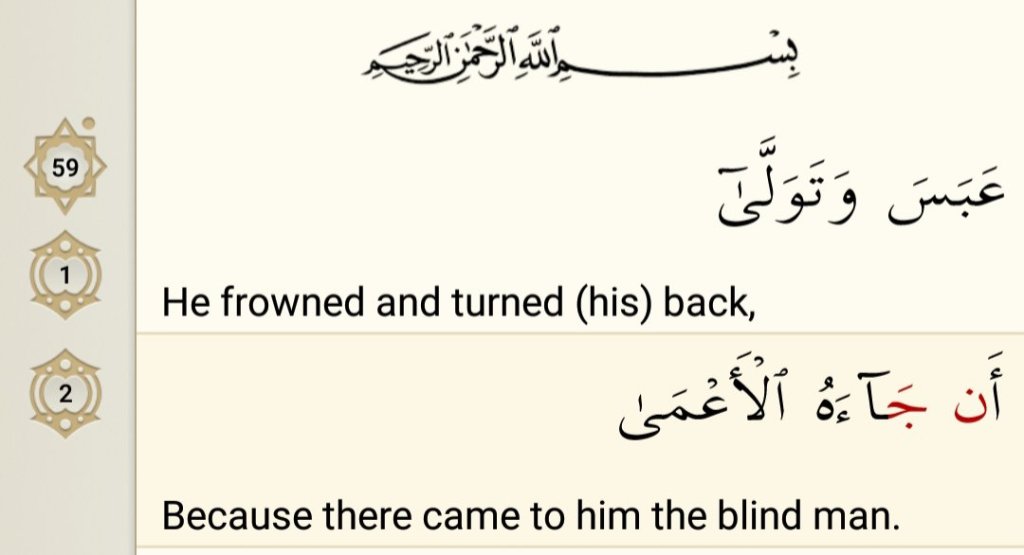
Once the Prophet pbuh was deeply engaged in trying to give Dawah to some pagan Quraish leaders. He was hopeful that it would attract them to Islam, and in so doing, surely a lot of others would come to Islam, too. And therefore, put an end to their sabotage. But suddenly he was interrupted by a blind man.
The blind man was Abdullah ibn Maktoom who was first cousin of Hazrat Khadija r.a and an early believer also. Abdullah ibn Maktoom r.a came to the Prophet pbuh while he was in discussion with the Quraish and according to one narration asks the Prophet pbuh: ‘Teach me from what Allah taught you’. He said this over and over again and because he did not hear the Prophet pbuh respond immediately he thought that perhaps he had not heard him.
After one knows Abdullah’s relationship with the Prophet pbuh, there remains no room for the doubt that he had turned away from him regarding him as a poor man having a low status, and attended to the high-placed people, for he was the Prophet’s brother-in-law and a man of noble birth. The reason why the Prophet pbuh had shown disregard for him is indicated by the word a ma (blind man), which Allah Himself has used as the cause of the Prophet’s inattention.
If you frown at someone they can only be offended if they see it. Allah does not mention the companion by name in this Surah just that he is blind. In another indication of the innocence of the Prophet pbuh we learn that he pbuh is not expressing frustration verbally rather we learn about him expressing it on his face as he turns away slightly in order to finish off his conversation. Can the companion notice him turning away – no. So, it is understood that he did not offend a believer.
However, if there is no problem why are these verses coming down? It is important to understand that the standards set for a Messenger of Allah pbuh are far higher than the standards Allah has set for the believers and we can never compare our standards to those of the Prophet Muhammad pbuh. Allah is extremely sensitive to every intricate mannerism and minute gesture of the Prophet pbuh.
The kind of perturbed expression that lasts only between your eyes in the middle of your forehead and which has no indication on your face or voice is called abas. So of all the words that could be used for frustration when the Prophet pbuh directed his frustration at a blind companion he expressed the minimal level of frustration humanly possible and even that Allah noticed and recorded. As we have already mentioned the mission of Islam was the Prophet’s pbuh top priority which is why he exhibited frustration.

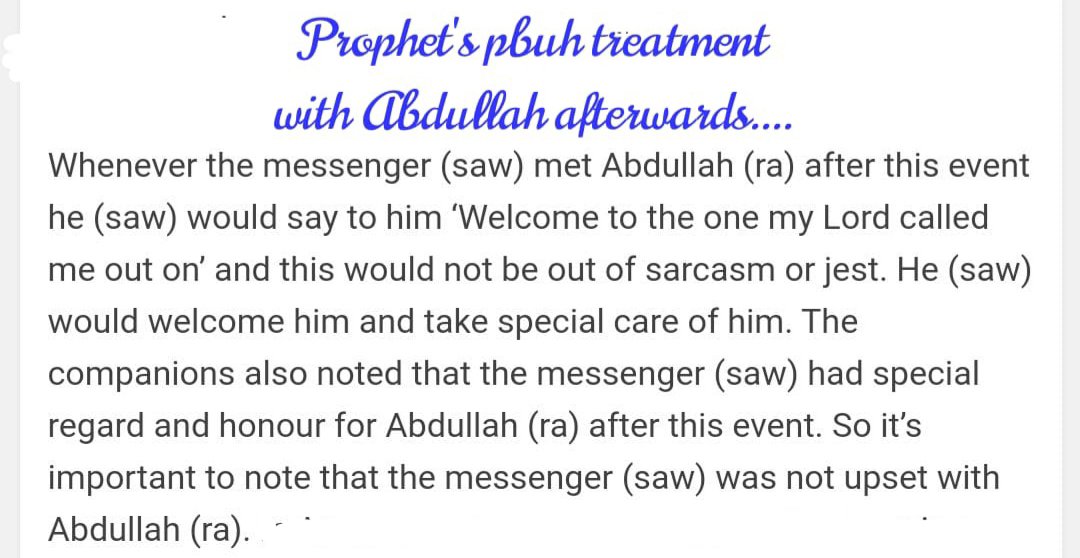
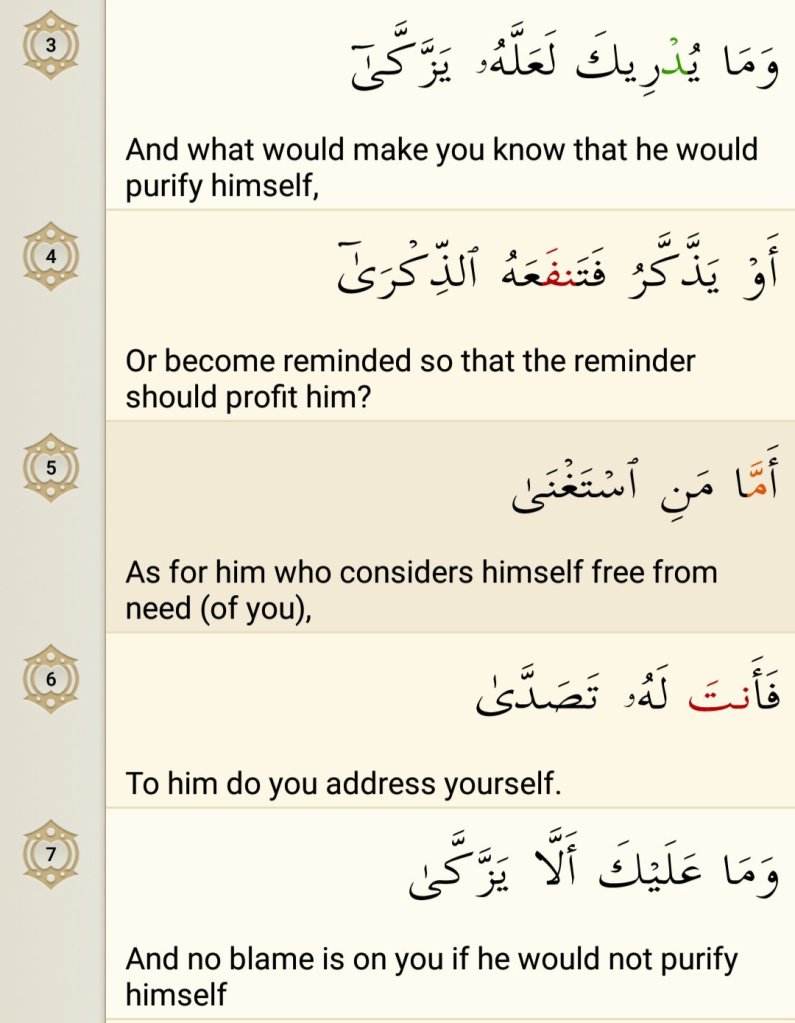
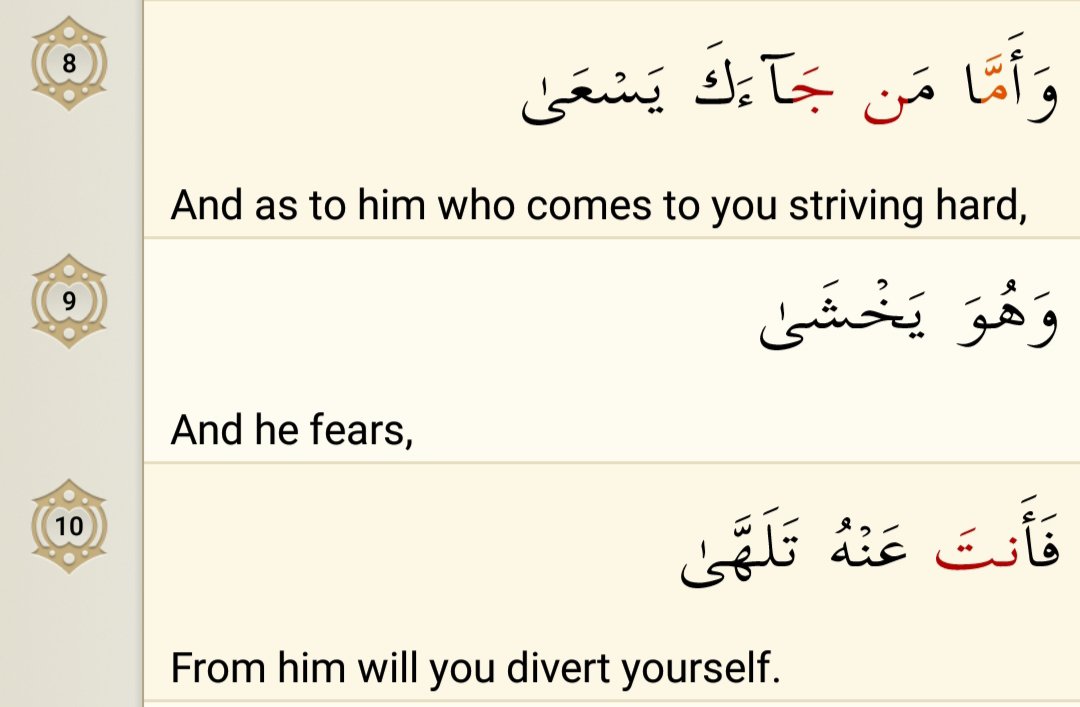
Allah tells the Prophet pbuh that he had no means to find out that perhaps the blind companion’s motive was to cleanse himself and try to become a better person.
This is the real point which the Prophet pbuh had overlooked in the preaching of Islam on that occasion, and for teaching him the same Allah first reproved him on his treatment of Ibn Maktoom, and then told him what really deserved to occupy his attention as preacher of the Truth and what did not. There is a man whose apparent state clearly shows that he is a seeker after truth: he fears lest he should follow falsehood and invite Allah’s wrath; therefore, he comes all the way in search of the knowledge of the true faith.
And there is another man, whose attitude clearly reflects that he has no desire for the truth; rather on the contrary, he regards himself as self-sufficient, having no desire to be guided to the right way. Between these two kinds of men one should not see whose becoming a Muslim would be of greater use for Islam and whose becoming a believer could not be of any use in its propagation. But one should see as to who was inclined to accept the guidance and reform himself, and who was least interested in this precious bargain.
The first kind of man, whether he is blind, lame, crippled, who might apparently seem incapable of rendering any useful service in the propagation of Islam, is in any case a valuable man for the preacher to the Truth. To him therefore he should attend, for the real object of this invitation is to reform the people, and the apparent state of the person shows that if he was instructed he would accept guidance.
As for the other kind of man, the preacher has no need to pursue him, no matter how influential he is in society. For his attitude and conduct openly proclaim that he has no desire for reform; therefore any effort made to reform him would be mere waste of time. If he has no desire to reform himself, he may nor the loss would be his, the preacher would not at all be accountable for it.

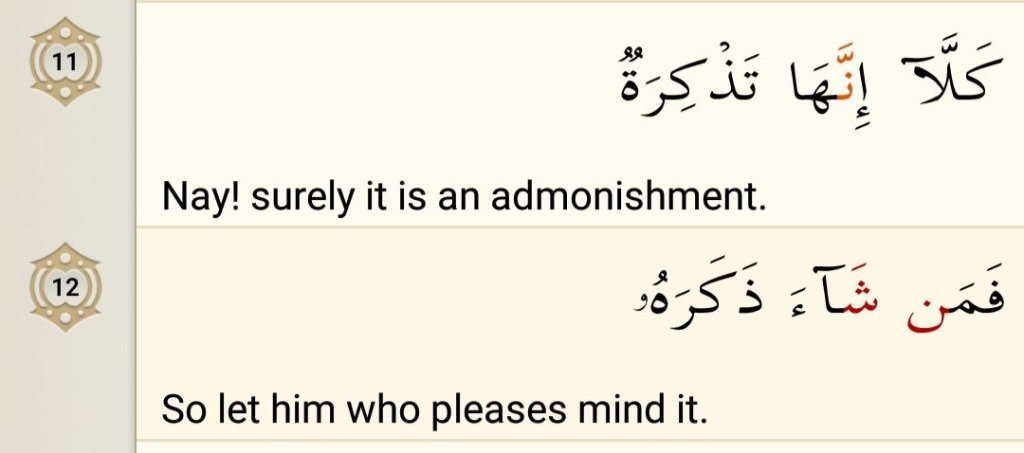
Allah is saying here that the Quran is not just a powerful reminder it is an incredibly powerful reminder. The word kala which means “nay!” means,
▪️‘You’ (Prophet pbuh) do not need to pay attention to those who are, apparently, gifted and self‑sufficient and are subsequently, proud, while neglecting the purified oppressed.
▪️It could be an answer to all accusations the pagans and the enemies of Islam uttered about the Quran. They called it ‘a poetry’, ‘a magic’, and sometimes ‘a kind of soothsaying’. The Quran demands that none of them are right, but that these verses of Quran are reminders for acknowledgment, awareness and faith. It contains the proofs and documents in itself. The people who approach it can get the facts, themselves, except its enemies.
Why is Quran a Reminder?
Tadhkira is the strongest possible word for reminder. Why does the Quran call itself a reminder as a reminder is something old which you already know? Thus, if the Quran is new revelation why is it calling itself a reminder? All human beings made a covenant will Allah before they came on this earth that Allah is his Lord (Ahd-e-Alast). In Surah Araf man bears this witness that Allah is his Lord. So, the belief in Allah is something that we are all predisposed and pre-programmed with and is a part of our nature. Every newborn is born on a predisposed nature or fitra that Allah fashioned people into. In our fitra is Islam but due to the environment people are brought up in, the religion of your family or culture a person can be forced away from Islam. So, the Quran is reminding you of something that is already deep in your heart. The people who will benefit from the reminder are the people who have something from their fitra left, a little bit of hope and light left.
All those evil inclinations…
The people mentioned in this surah have no inclination left. Sometimes when you try to convince someone of an idea but they remain unconvinced you can sometimes feel that maybe there was something missing in your argument or a shortcoming. But Allah gives His Messenger pbuh confidence by convincing him that his reminder is the most powerful reminder with nothing missing in it and if someone does not take advantage of it then it is through no shortcoming of his pbuh.
Only if you intend , you get it…
Whoever wants may take some remembrance from it. This points to both the lack of obligation, and an evidence to exercise of free‑will for everyone ‑ that is, no one can obtain its merits unless one wishes to and makes the decision to follow its guidance.
The Quran is the most powerful means of delivering a reminder and whoever wants can make mention of it i.e. the Messenger pbuh is being told ‘you deliver it and warn people and they will be responsible for whether they take it or not’.
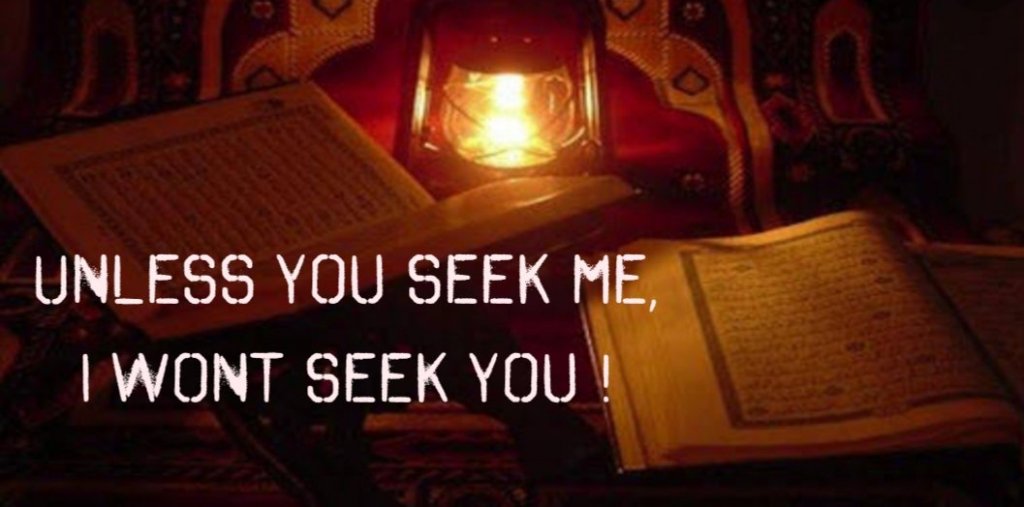
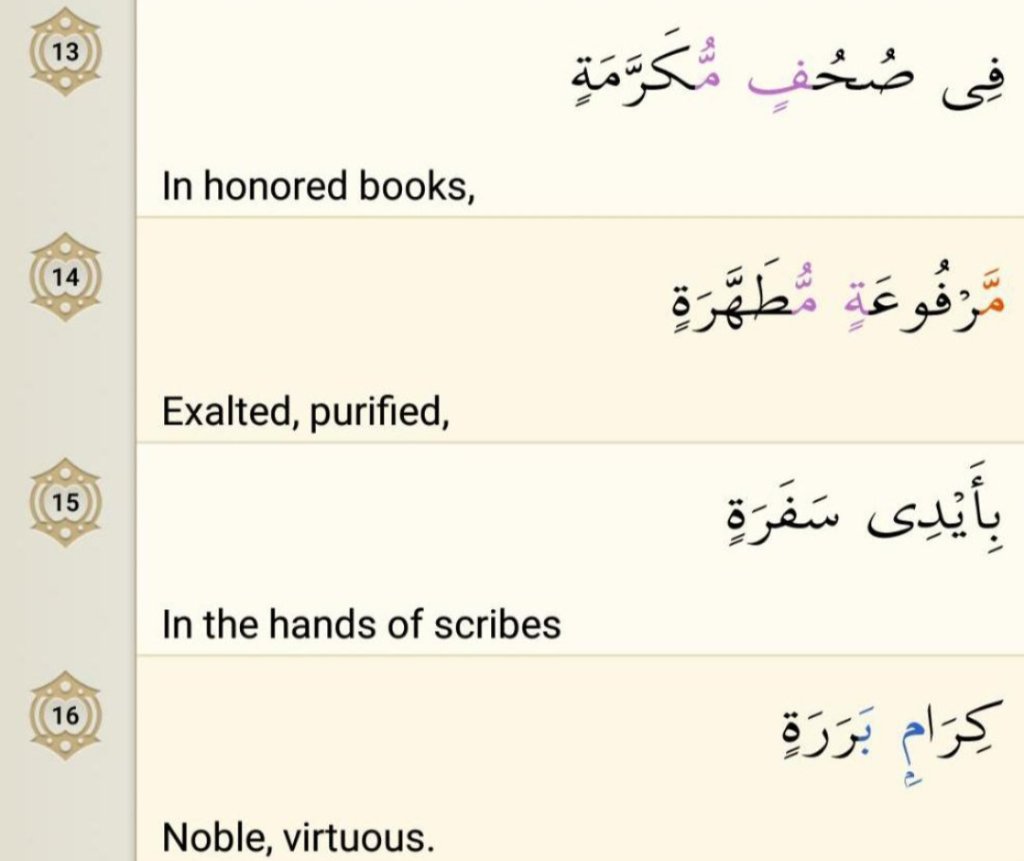
(It is) in Books held (greatly) in honor…
The term suhuf means ‘tablet’ or ‘sheet’ or ‘anything on which something can be written’. This shows that the verses of Quran had been written on some tablets before they were revealed to the Prophet pbuh, and the angels of revelation possessed them, therefore, it means that the tablets were in a very high position.
Quran is purified means it is free from all kinds of mixtures of false ideas and thoughts, and presenting nothing but the pure Truth. There is no tinge whatever in these scrolls of the impurities with which the other religious boors of the world have been polluted. They have been kept pure and secure from all kinds of human speculation and evil suggestions.
Exalted (in dignify) kept pure and holy…
It is beyond the reach of the aberrant ones; they cannot distort it; it is pure and kept far from tainted hands. Finally, it is pure from any contradiction, discrepancy and doubt.
By honouring the status of the message like this of Quran the disbelievers are belittled. The Prophet pbuh who was so serious in delivering his message in the face of the disbelievers who were so casual and thought they had the upper hand is now given the upper hand by Allah.
In the hands of scribes, Honourable and obedient…
This refers to the angels who were writing the scrolls of the Quran under the direct guidance of Allah, were guarding them and conveying them intact to the Prophet pbuh. Two words have been used to qualify them: karim, i.e. noble, and barr, i.e. virtuous. The first word is meant to say that they are so honored and noble that it is not possible that such exalted beings would commit even the slightest dishonesty in the trust reposed in them. The second word has been used to tell that they carry out the responsibility entrusted to them of writing down the scrolls, guarding them and conveying them to the Messenger with perfect honesty and integrity.
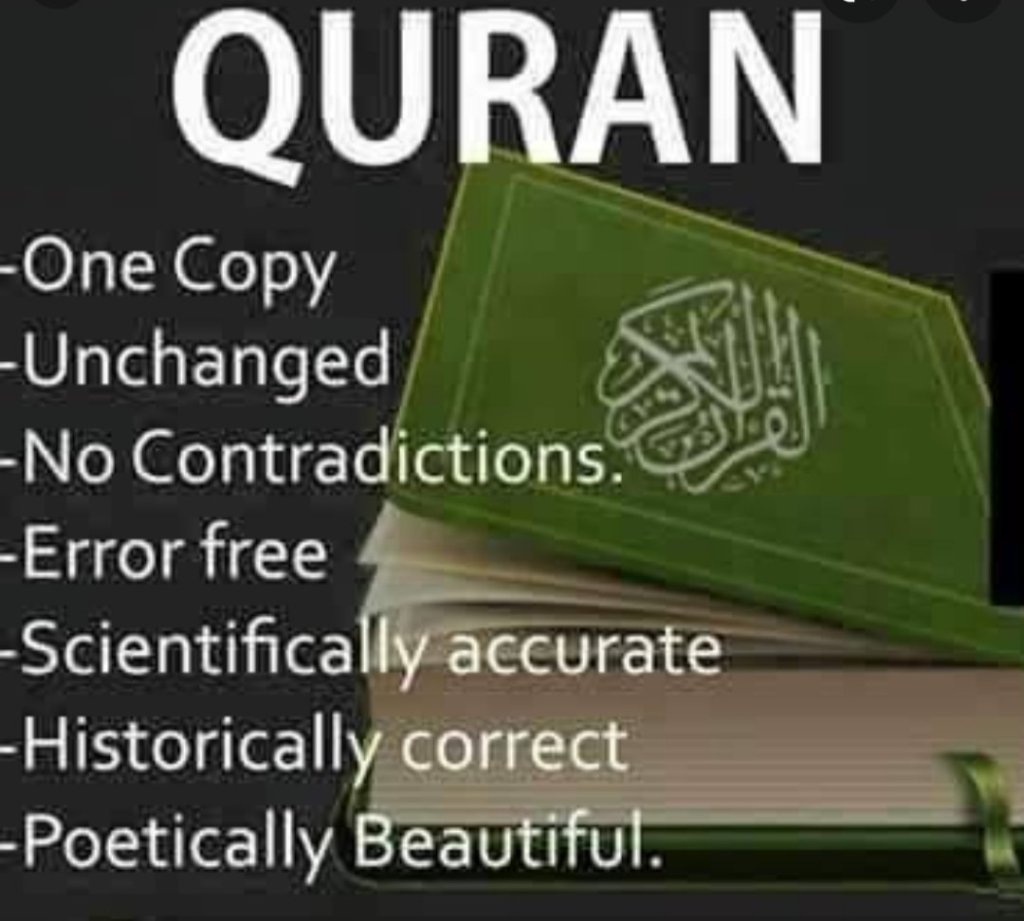

This is the central verse of this Surah where Allah says Perish man! How ungrateful he is!
This is a very sharp scolding and criticism and literally means the human being has destroyed himself. Ma akfarah means how incredible is his disbelief and his capacity to deny. This is a format used in the Arabic language to express shock, anger and amazement at something. So, the human being has destroyed himself with his relentless and incredible disbelief.
In the previous surah Allah gave the worst possible example of kufr in Firaun and in this surah he is speaking of the entire human race that follows Firaun’s legacy in denying the truth. Allah talks of the ultimate sign in the Quran and again mankind amazes in its capacity to disbelieve.
At all such places in the Quran, “man” does not imply every individual of the human race but the people whose evil traits of character are intended to be censured. At some places the word “man” is used because the evil traits are found in most of human beings, and at others for the reason that if the particular people are pin-pointed for censure, it engenders stubbornness. Therefore, admonition is given in general terms so as to be more effective.
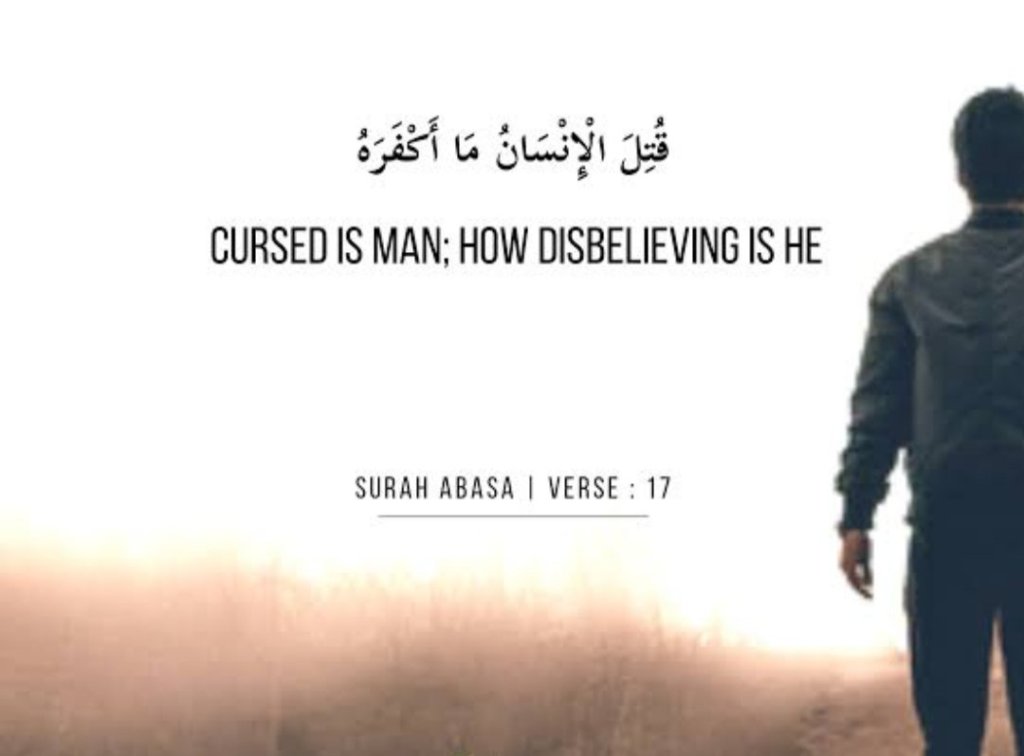
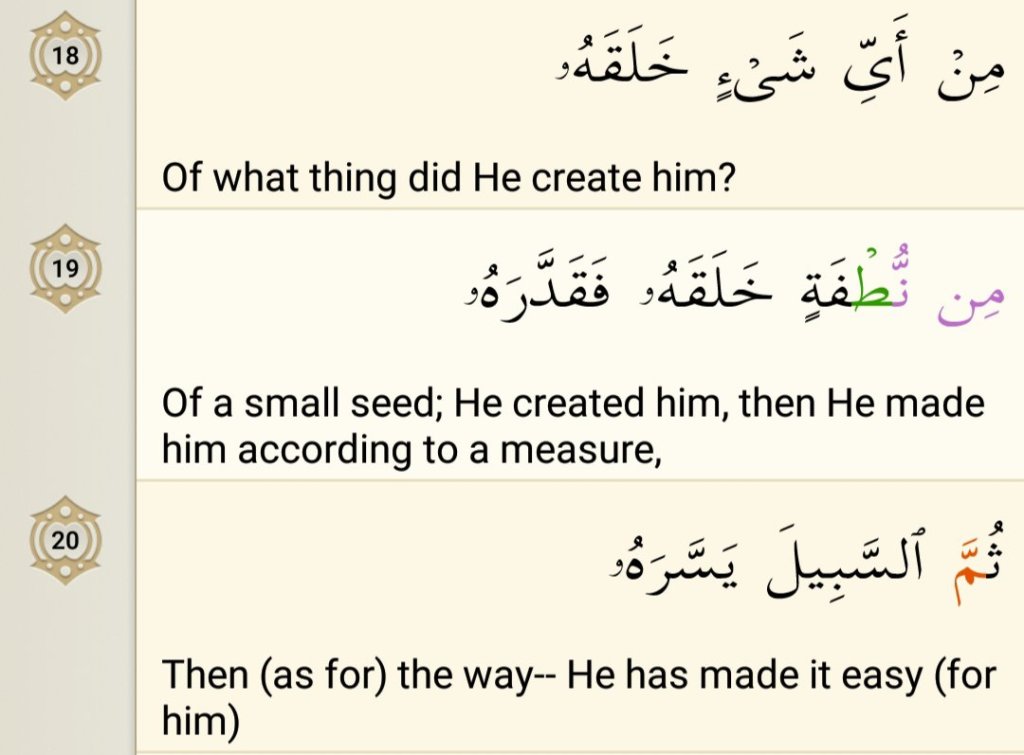
Since the origin of disobedience and ungratefulness of man is generally pride, then to break this thing these verses says that why does man not think about the origin of his creation? Why does he forget his main source? Moreover, why does he not take note of Allah’s ability in the creation of this strange creature from a sperm‑drop? If he contemplated on his creation from a sperm‑drop and, then, about the formation of his body and its limbs, and his faculties and abilities and even his necessities of life being in a suitable proportion, it could be the best guidance for his theological and divine knowledge.
Then Allah makes man’s path easy for him. Scholars commented that sabeel is the passage of the child coming out of the womb of the mother. Allah opened this path for man so that he could come into this world. But how pathetic man is that he could not go down this path himself. Allah facilitated this and made it easy for man.
Scholars also comment that in addition this sabeel and path that Allah opened is also talking about the path to guidance that He made easy for us by giving us access to Messengers, the clearest revelations, the most powerful of reminders and man’s natural fitrah and disposition which all contributes to guiding us to the correct path. All of this is facilitated for us to make it easier for man to believe yet still he disbelieves and how incredible is his capacity to disbelieve.
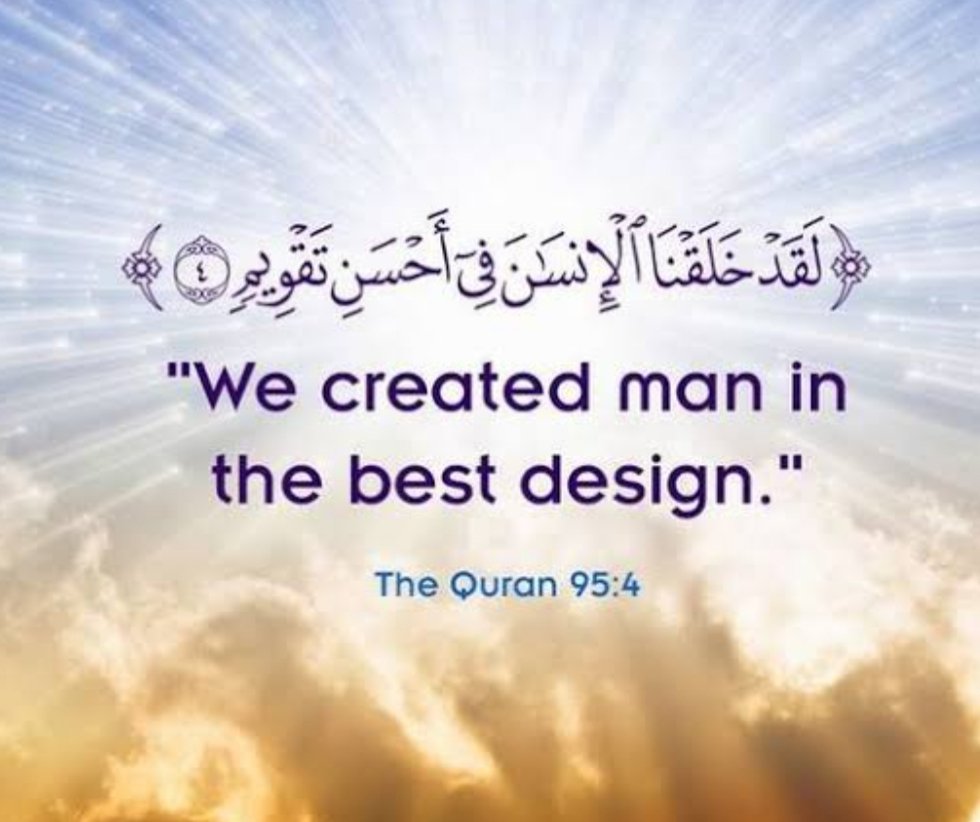
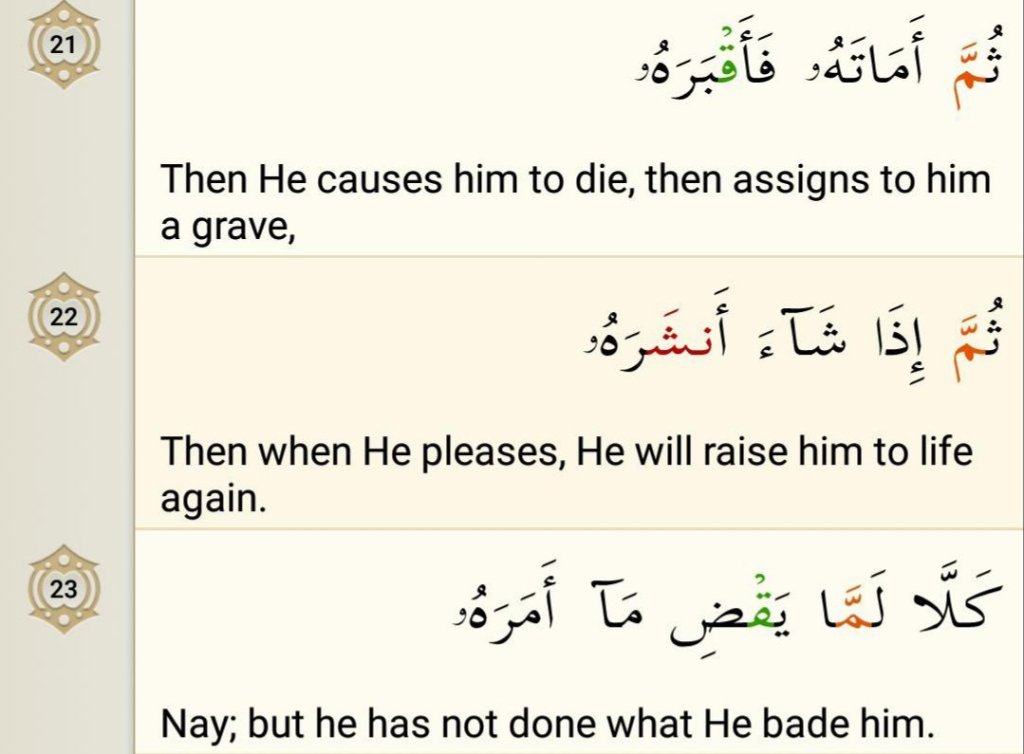
After making the path into this world and guidance easy for man Allah causes him to die and made sure he ends up in his grave. Thus, man is not in control of his death let alone his life. Qabr in Arabic means to be entered into the earth regardless of whether you are cremated and your ashes are scattered or you have a proper grave, ultimately all creatures will decay and be entered into the. So man came from something pathetic (nutfah) and then will be reduced to dirt again. So, Allah is putting the human in his place here.
For our growth from a baby to an adult there is a process we go through to grow into adulthood but our resurrection will be immediate with no process. Allah will not just raise us but gather us and send us forward to the place that we are supposed to meet on the Day of Resurrection. Nashara literally means to spread and when speaking of a corpse means that it has decayed to the extent that its remains have dispersed into the earth. So Allah is saying that He will raise man and then spread him out meaning all humans will be spread out and eventually gathered at the land we are supposed to gather.
Then Allah says Nay, but man has not done what He commanded him! Qada means to fulfil a responsibility in such a way that you are no longer responsible for it, a one time task. Allah is saying the human being has not fulfilled his duty up until now. Still after all these reminders man has still not got his act together but there is still hope for he to struggle.
The term lamma is usually used with a negative meaning when something is still expected. It touches on this sense that man, having these Divine gifts and the means of guidance, is expected to be earnest and obeying Allah and acting on His commands, but surprisingly he has not done it yet.

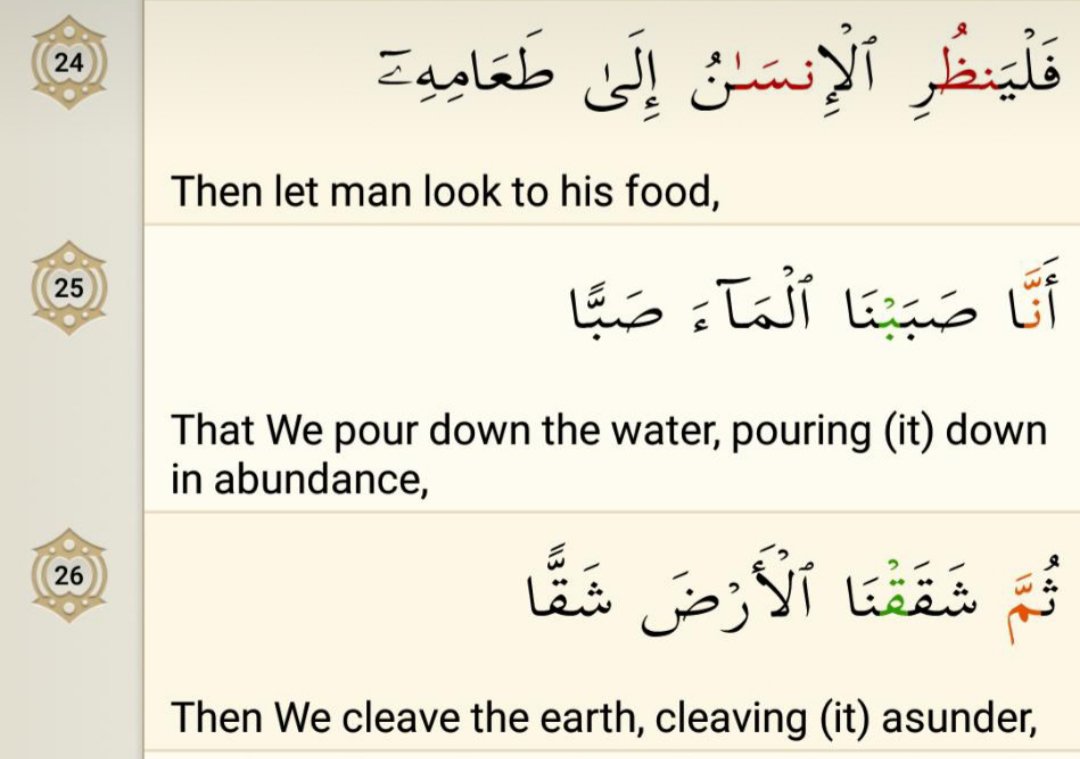
Man Should Look At His food!
Since the aforementioned verses allude to the Resurrection and the next verses also refer more vividly to this very matter, it seems that these verses are a proof for the Resurrection. By explaining Allah’s authority over all things and also reviving the dead lands by sending down rain, which is a resurrection in itself for plants, proves the possibility of Resurrection.
Since these verses mention the different kinds of nourishment that Allah has given to man and his cattle, they call him to thank Allah and pay heed to the knowledge of Him. So first Allah says:
Then let man look to his food… and considers how Allah has produced it. The closest exterior substance, to man, is his food which, after some changes is easily absorbed and becomes part of his body, therefore, if he cannot obtain it he will perish. That is why the Quran, among all things, puts emphasis on the nourishment; especially those produced from trees and plants.
It is clear that the aim of saying ‘look to’ is not a simple look, but it means with deep care and contemplating on the vital elements and wonderful structure of the nourishment, and the surprising effects they have on him so consequently, he should think about the Creator, Who has created them.
Then Allah says He pours water down abundantly from the sky. Sab literally means to pour a bucket over somebody so Allah pours heavy rain. It is Allah that sends that water down to make way for these nourishments.
Shaq means to cut open something that you do not think of cutting open. The verse points to one of the miracles of the Quran. In science, when it says it rains, first, then the earth cleaves asunder and becomes fit for farming. This not only happened in the very early days, but also keeps occurring today.
It is really wonderful that a little smooth seedling can break the hard, solid land and sometimes it shoots up through stone. What a surprising power the Creator has given to this tiny smooth seedling which enables it to do so!
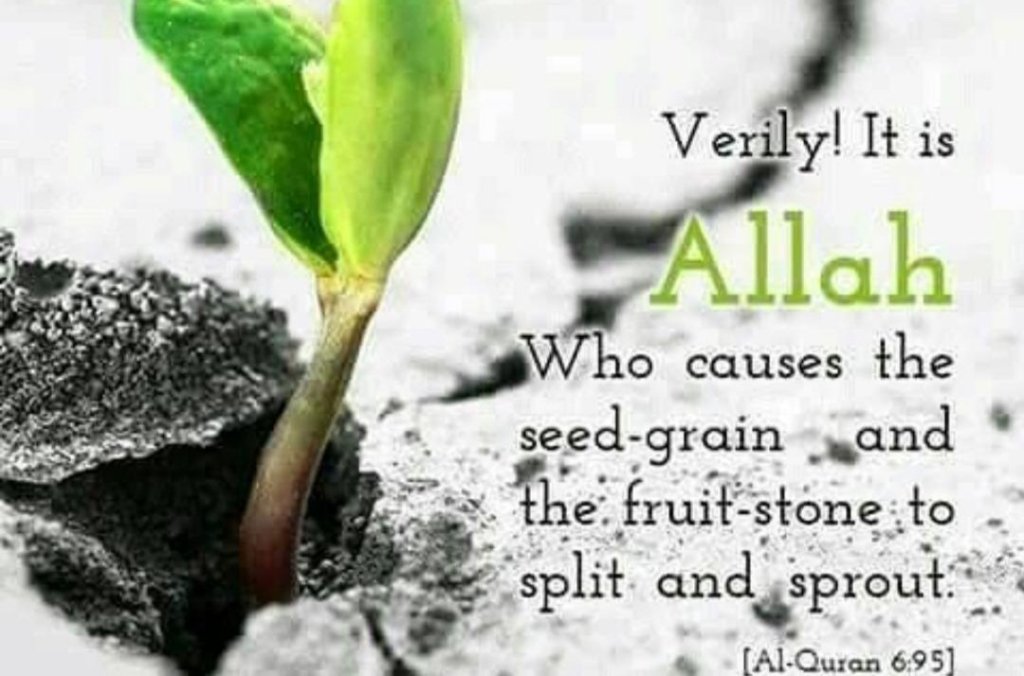
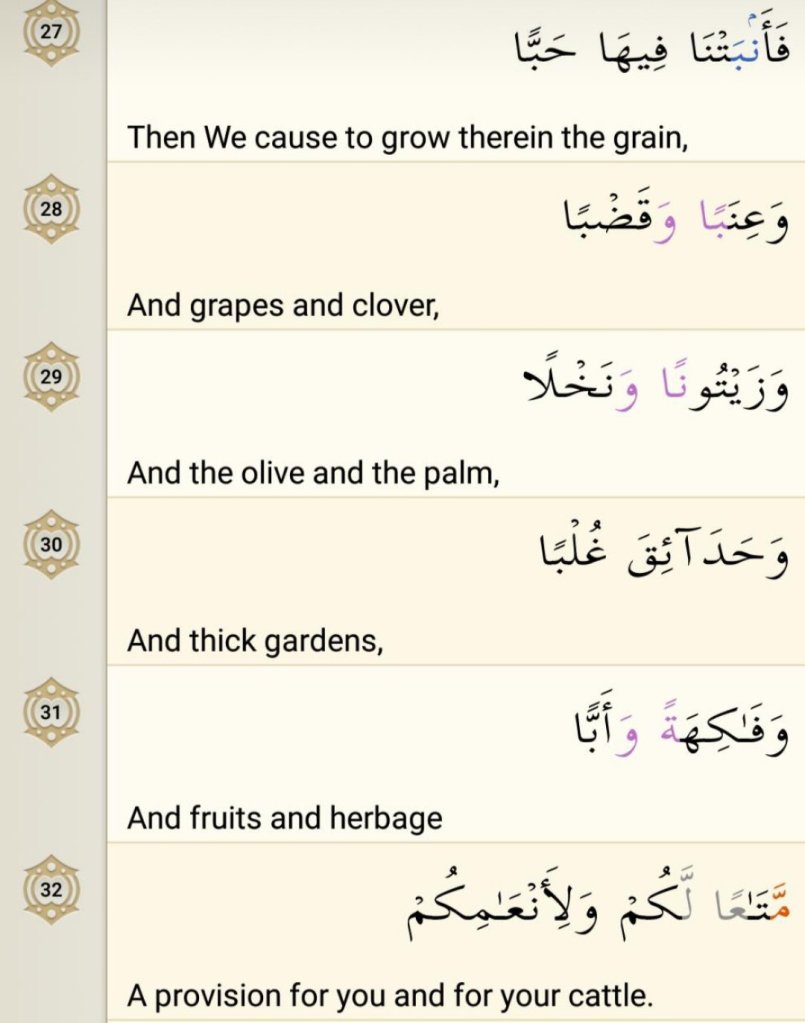
After cleaving the earth, now Allah continues that how He causes grain to grow therein. Habba means corn/grain, the seeds of cereal grass; wheat, oats or barely, or the plants producing them. They are the essential sources of man’s and cattle’s nourishment’s during the year, the lack of which, because of drought, causes famine and starvation, a great plague for the world. The most important vegetation is mentioned first – grain and all types of grain are included in this.
Grapes & vegetation…
Then Allah mentions grapes and vegetation. Inab is grapes and Qadb is all types of vegetation and mostly that type of vegetation that grows under the earth so that animals eat the top part like the leaves and humans the bottom part that grows under the ground such as the carrot.
The olive and the date palm… These are luxuries. So it’s moving from essentials to more exotic types of food.
Gardens dense with many trees…
Well guarded lush gardens where the trees are thick and the branches intertwined.
And fruits and (green) pastures…
Faakiha means delicious fruit and comes from the verb fakiha which means to be overjoyed as a person feels good when he eats fruit. Faakiheen is also used for people in Jannah who will be overjoyed everytime they take a bite of something. Ab is used for grass typically used for pasture.
Allah mentions first man and then animals as the verses preceding have been speaking mainly about food for mankind. This all is provision for you and your cattle, a means of sustenance not only for you but also for those animals from which you obtain items of food like meat, fat, milk, butter, etc and which perform countless other services also for your living. You benefit by all this and yet you disbelieve in Allah Whose provisions sustain you.

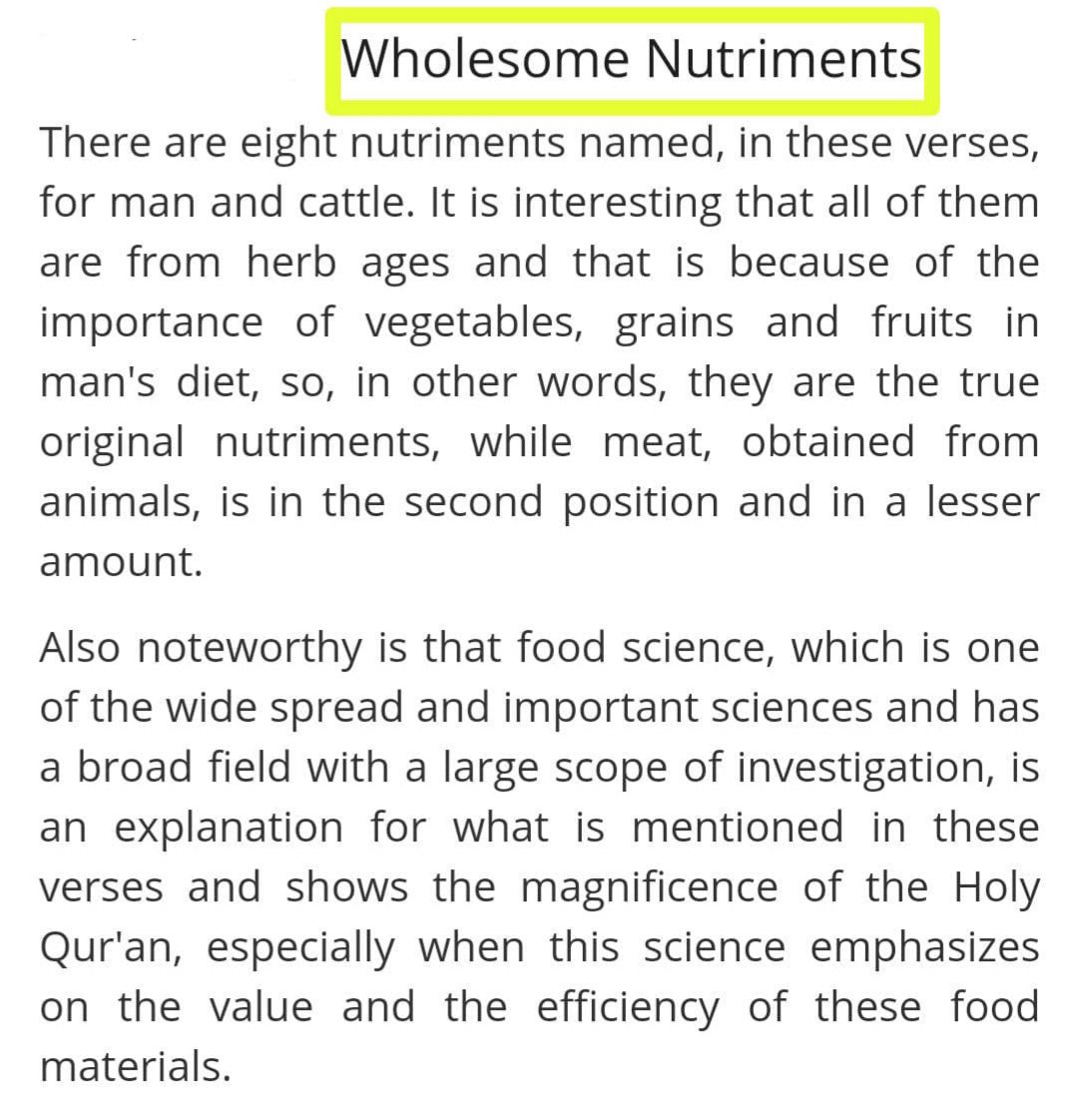
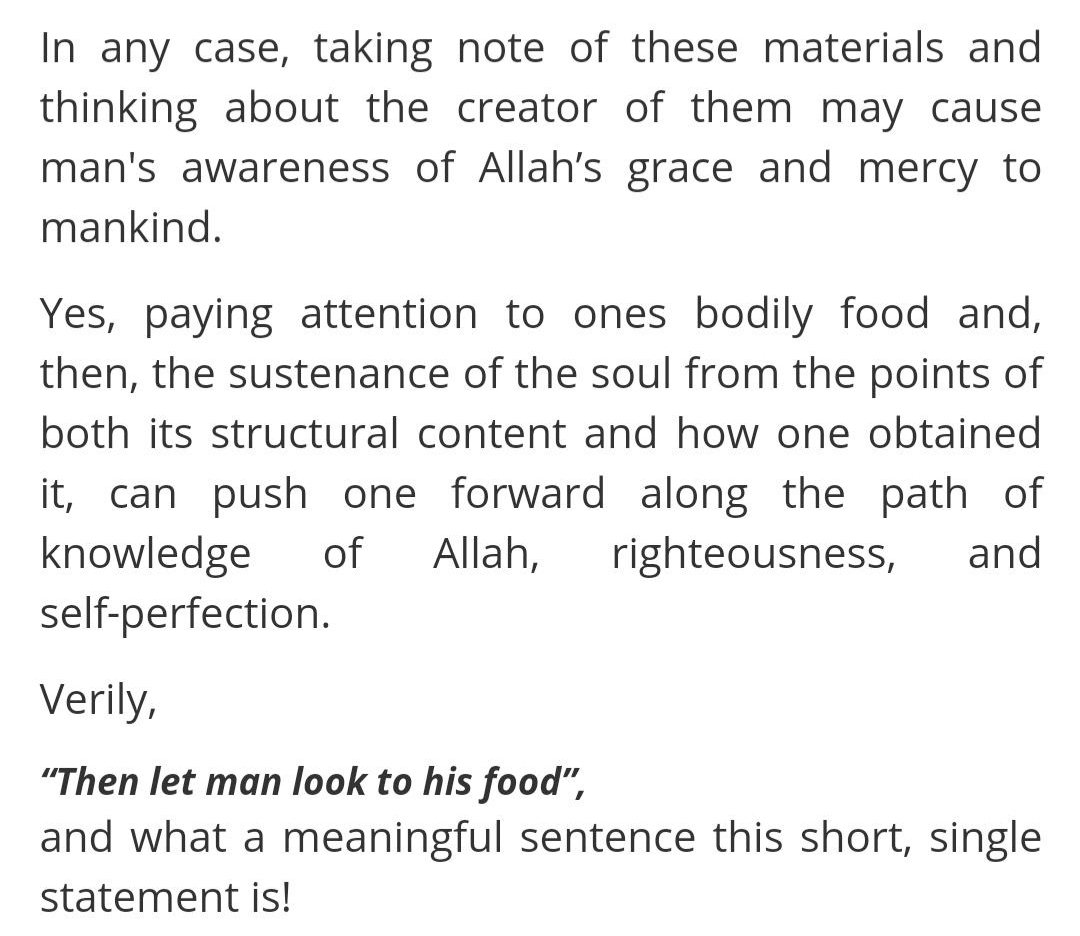
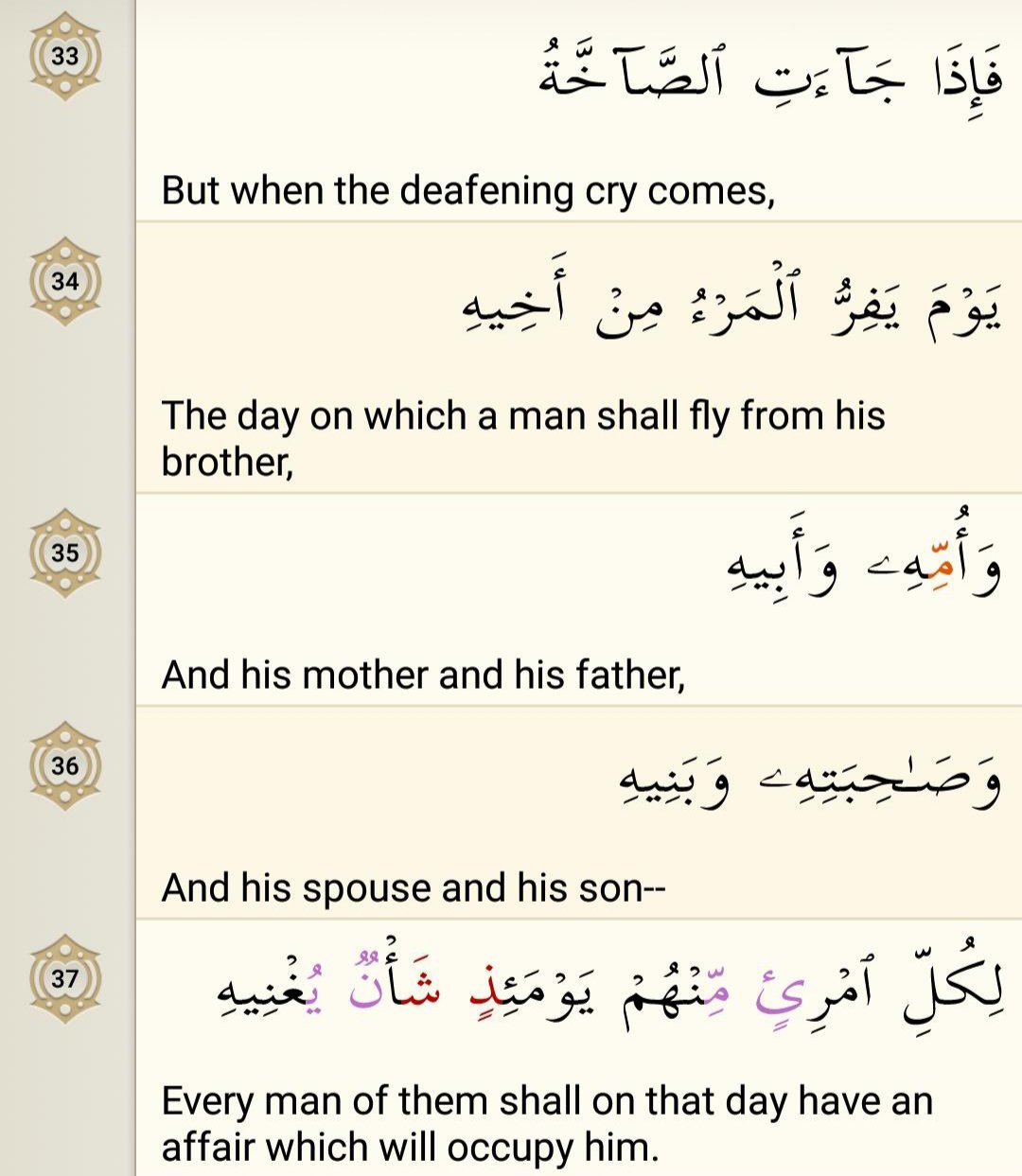
The Resurrection Cry!
Then Allah says when there comes the loud sound (the second blowing of the trumpet).
It points here to the second sound of the blast of the trumpet, the very great cry which brings the dead to life again and makes them go forth to the gathering place for the final Judgment. Verily, the cry is so loud and shocking that everyone forgets all but one’s end resulting from one’s own actions.
As-Saakhkhah is a loud sound or scream that is so loud that whoever comes into hearing of it turns deaf and so it is a deafening loud scream. So Allah us making a case that O Man! you can avoid the Divine warnings and message now but As-Saakhkhah is coming and you won’t be able to avoid that.
That Day man shall flee from his brother. The same brother who was loved sincerely, was helped in everything favorably, now he flees from that brother abruptly.
And man flees from his mother and his father, and from his wife and his children. Thus, individuals not only leave the nearest and the dearest members of their family such as their brother, father, mother, wife, and children, but also flee from them. This statement shows that the horror and the fear of the Day is so much so that it makes individuals cease all their wishes and affections. In the probationary life, mother was loved by her child very much; father was highly respected by his son; wife was eagerly beloved by her husband; children were the best for their father, as the apples of his eyes; but now, in the eternal life, one flees from all of them!
Each one of the people on that day have enough preoccupations of his own, every man that day will have enough to make him careless of others. Yughnih means what makes man self‑sufficient. It shows that on that Day, man is so busy with his affairs that he does not pay attention to anyone; and the events are so terrible and overwhelming as to occupy him and his mind, totally.
Allah is saying that this man who was so chivalrous and helpful will be involved in a very important task. Sha’n is a matter or issue which is very important to oneself. The task will be to remember what they worked towards. They will be so involved in this it will have the affect of forgetting about everything else. This is in contrast to the beginning where the disbeliever found the message unimportant. On that day he will be unconcerned about everything else.
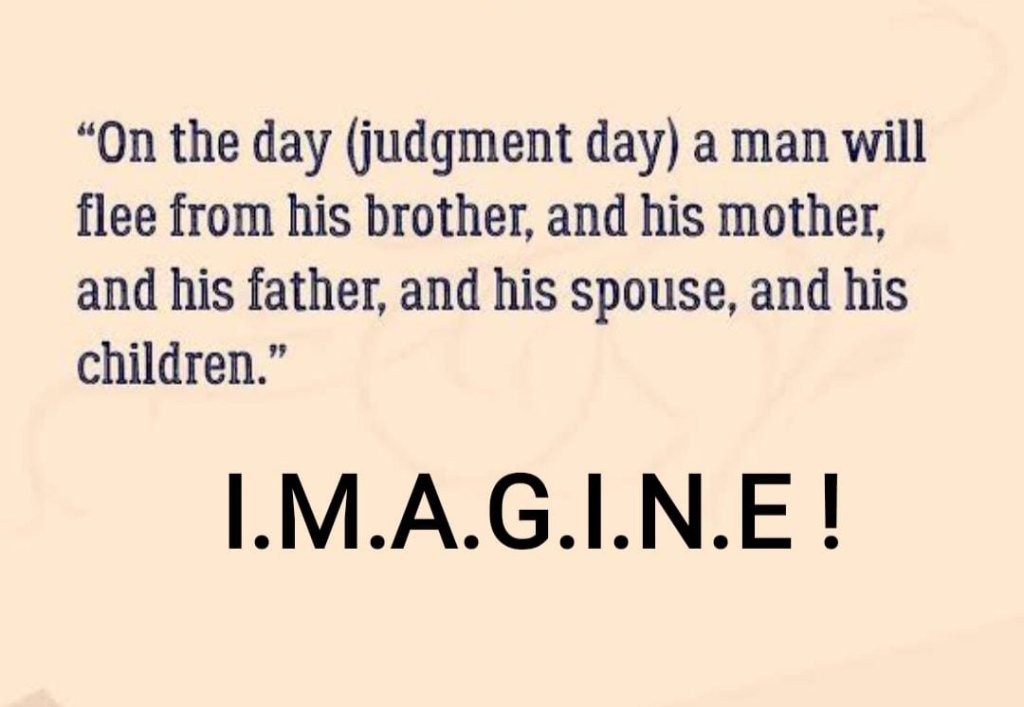
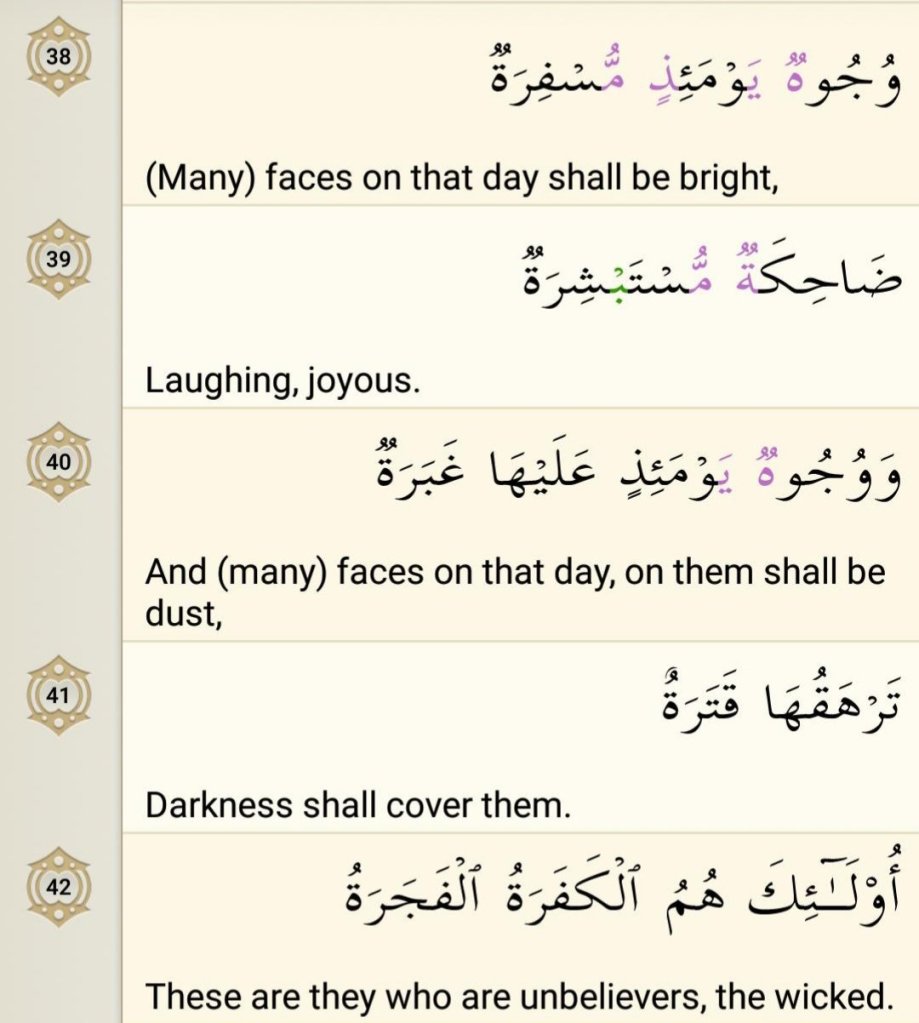
Concluding the Surah, Allah describes the situation of the believers and disbelievers on the Final Day. Some faces that Day will be bright, laughing and rejoicing. And some faces that Day will be dust‑stained, blackness will cover them.
The Believers…Happy!
Some faces on that day will be lit up as though a smile was hiding behind a veil and it is unveiled. Safara in Arabic means to unveil. Allah highlights here that maybe the believer experienced a difficult life and now finally he will have lots of reasons to smile.
Daahika means uncontrollable laughter. The previous Surah was a description of hearts and this Surah is a description of the face. So the two surahs complement each other by talking about what is going on in the inside and on the outside. Istibshaar means to be full of delight because of good news that comes to you. It comes from bishr which means skin and bashara means to peel skin like an orange. Istibshaar thus means you are so happy it’s as if the sadness has been peeled away from your face and the happiness is revealed.
The Disbelievers…Doomed!
Ghabara is dust which flies around and lands on things and settles. So some faces will have that dirty dishevelled look and this is not just physical dust. Imagine the sadness and depression of that Day on the one who does not literally have dust on him but will look as if he has dust on his face and his skin tone has changed, such are the pressures of that Day.
Rahaq is something which forcefully overshadows or climbs over something else. Qatara is used for smoke which comes out of burning wood and is used for the smoke emitted when you barbecue something. So, this black smoke will force itself on them and they won’t be able to take if off. So there is dust and on top of that this black smoke on them.
These are the disbelievers that think themselves free of need of anything. Fajara means the ones who disobey Allah in the worst ways, openly and viciously.
